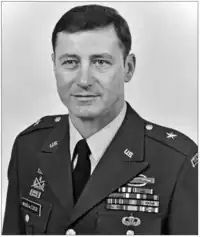Huba Wass de Czege
A Hungarian immigrant, Brigadier General Huba Wass de Czege (pronounced VOSH de TSEH-geh) (born August 13, 1941) is the son of Count Albert Wass de Szentegyed et Czege. Wass de Czege retired from the United States Army as a General Officer with a reputation as a highly innovative thinker.[1] He is the founder and first director of the School of Advanced Military Studies at the United States Army Command and General Staff College.
Huba Wass de Czege | |
|---|---|
 | |
| Born | August 13, 1941 Kolozsvár, Kingdom of Hungary |
| Allegiance | United States |
| Service/ | United States Army |
| Years of service | 1964–1993 |
| Rank | Brigadier General |
| Battles/wars | Vietnam War |
| Awards | Silver Star Legion of Merit Bronze Star Medal |
Career
He graduated as an infantry officer West Point in 1964. He was a platoon leader in the 8th Infantry Division stationed in West Germany. He was deployed to Vietnam in January 1967. During his first tour he was a senior advisor for a Vietnamese Ranger battalion. On his second tour he commanded Company A, 3rd Battalion, 503rd Infantry Regiment. He served two tours in Vietnam where he earned five Bronze Stars, and the Silver Star for Gallantry in action. After returning from Vietnam he graduated from the Infantry Officer Advanced Course in 1970. After he attended John F. Kennedy School of Government at Harvard University. He also graduated from the Command and General Staff College at Fort Leavenworth in 1976. During these years he served in different series of assignements in the 9th Infantry Division: ha was also commander of the 1st Battalion, 60th Infantry Regiment.
Wass De Czege was a principal designer of the operational concept known as AirLand Battle which was the doctrinal concept of the U.S. Army for many years. He was the founder and first director of the Army's School for Advanced Military Studies where he also taught applied military strategy. In the late 1980s he was selected to command the 1st Brigade 9th Infantry Regiment of the 7th Infantry Division (Light). His most senior military position was assistant division commander as a brigadier general of the 1st Infantry Division. After retiring in 1993, Huba Wass De Czege became heavily involved in the Army After Next Project and served on several Defense Advanced Research Projects Agency advisory panels.
In the 1970s, Wass de Czege was a member of the Department of Social Sciences at West Point. Source: Association of Graduates, USMA, The Register of Graduates and Former Cadets, USMA West Point: 2008.
Since his 20s, Wass de Czege has been an enthusiastic horseman, and has been involved with schooling and showing jumpers and hunters.
He is a consultant to the U.S. Army Training and Doctrine Command.
Awards and decorations
 | ||
 | ||
| Badge | Combat Infantryman Badge | |||
|---|---|---|---|---|
| Badge | Senior Parachutist Badge | |||
| 1st row | Silver Star | Legion of Merit with bronze oak leaf cluster | ||
| 2nd row | Bronze Star Medal with "V" Device and four bronze Oak Leaf Clusters | Meritorious Service Medal (United States) | Air Medal | |
| 3rd row | Achievement Medal | National Defense Service Medal w/ one bronze service star | Vietnam Service Medal w/ four bronze service star | |
| 4th row | Republic of Vietnam Gallantry Cross w/ two stars | Vietnamese Training Service Medal 2nd class | Republic of Vietnam Campaign Medal w/ 1960– device | |
| Unit awards | Gallantry Cross Unit Citation | |||
| Badge | Ranger Tab | |||
References
- http://www.slate.com/articles/news_and_politics/war_stories/2003/04/force_majeure.html Force Majeure, What lies behind the military's victory in Iraq.
- Association of Graduates, USMA, The Register of Graduates and Former Cadets, USMA West Point: 2008.